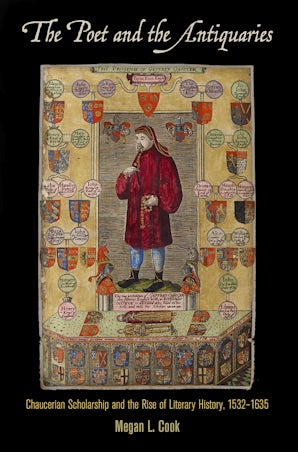
The Poet and the Antiquaries
Chaucerian Scholarship and the Rise of Literary History, 1532-1635
by Megan L. Cook
12 illus.
Between 1532 and 1602, the works of Geoffrey Chaucer were published in no less than six folio editions. These were, in fact, the largest books of poetry produced in sixteenth-century England, and they significantly shaped the perceptions of Chaucer that would hold sway for centuries to come. But it is the stories behind these editions that are the focus of Megan L. Cook's interest in The Poet and the Antiquaries. She explores how antiquarians—historians, lexicographers, religious polemicists, and other readers with a professional, but not necessarily literary, interest in the English past—played an indispensable role in making Chaucer a figure of lasting literary and cultural importance.
After establishing the antiquarian involvement in the publication of the folio editions, Cook offers a series of case studies that discuss Chaucer and his works in relation to specific sixteenth-century discourses about the past. She turns to early accounts of Chaucer's biography to show how important they were in constructing the poet as a figure whose life and works could be known, understood, and valued by later readers. She considers the claims made about Chaucer's religious views, especially the assertions that he was a proto-Protestant, and the effects they had on shaping his canon. Looking at early modern views on Chaucerian language, she illustrates how complicated the relations between past and present forms of English were thought to be. Finally, she demonstrates the ways in which antiquarian readers applied knowledge from other areas of scholarship to their reading of Middle English texts.
Linking Chaucer's exceptional standing in the poetic canon with his role as a symbol of linguistic and national identity, The Poet and the Antiquaries demonstrates how and why Chaucer became not only the first English author to become a subject of historical inquiry but also a crucial figure for conceptualizing the medieval in early modern England.